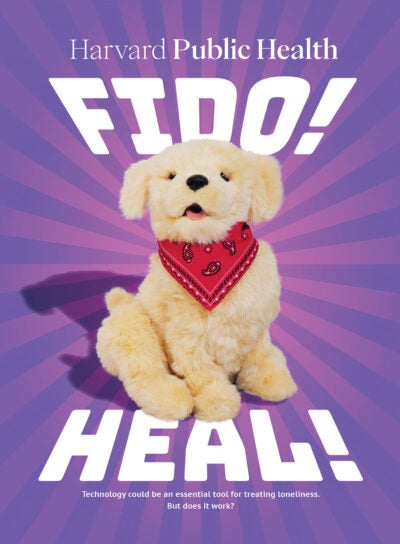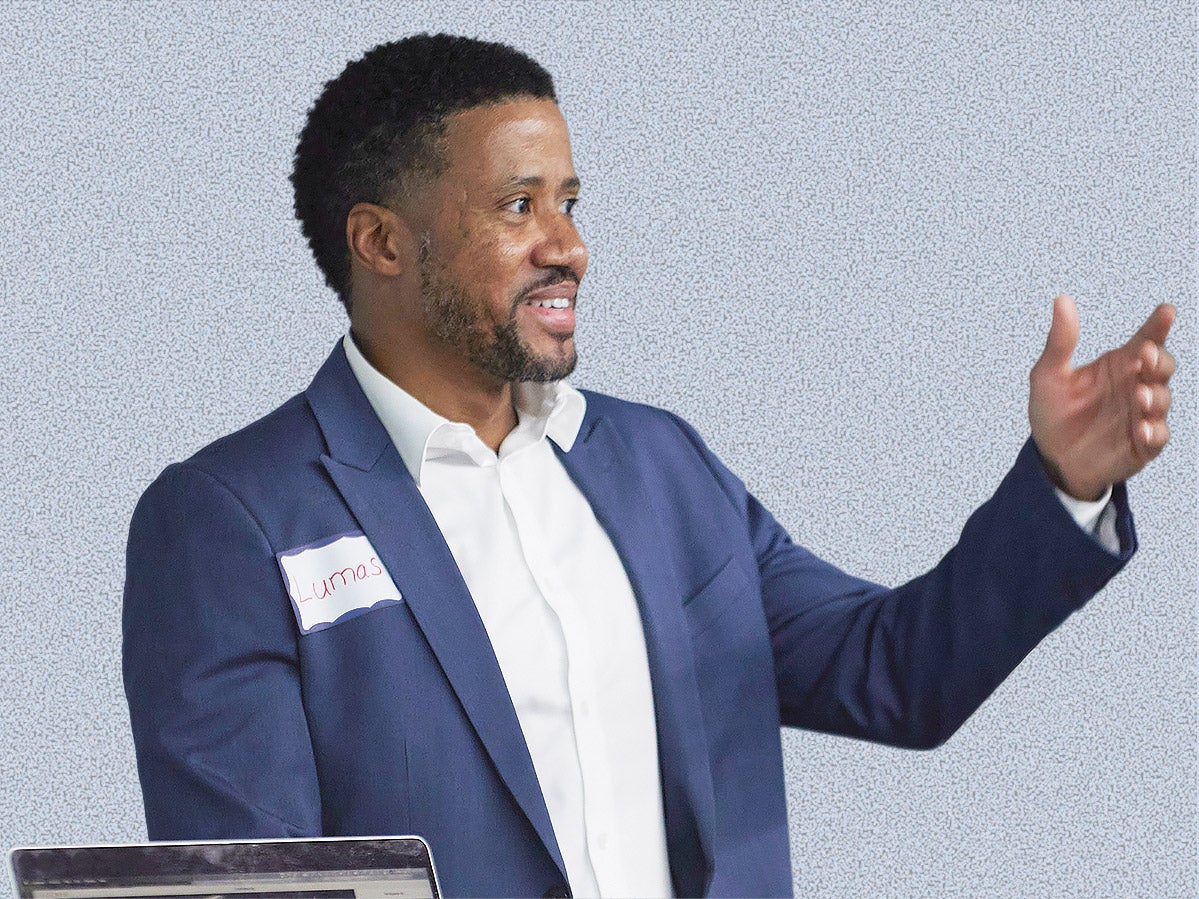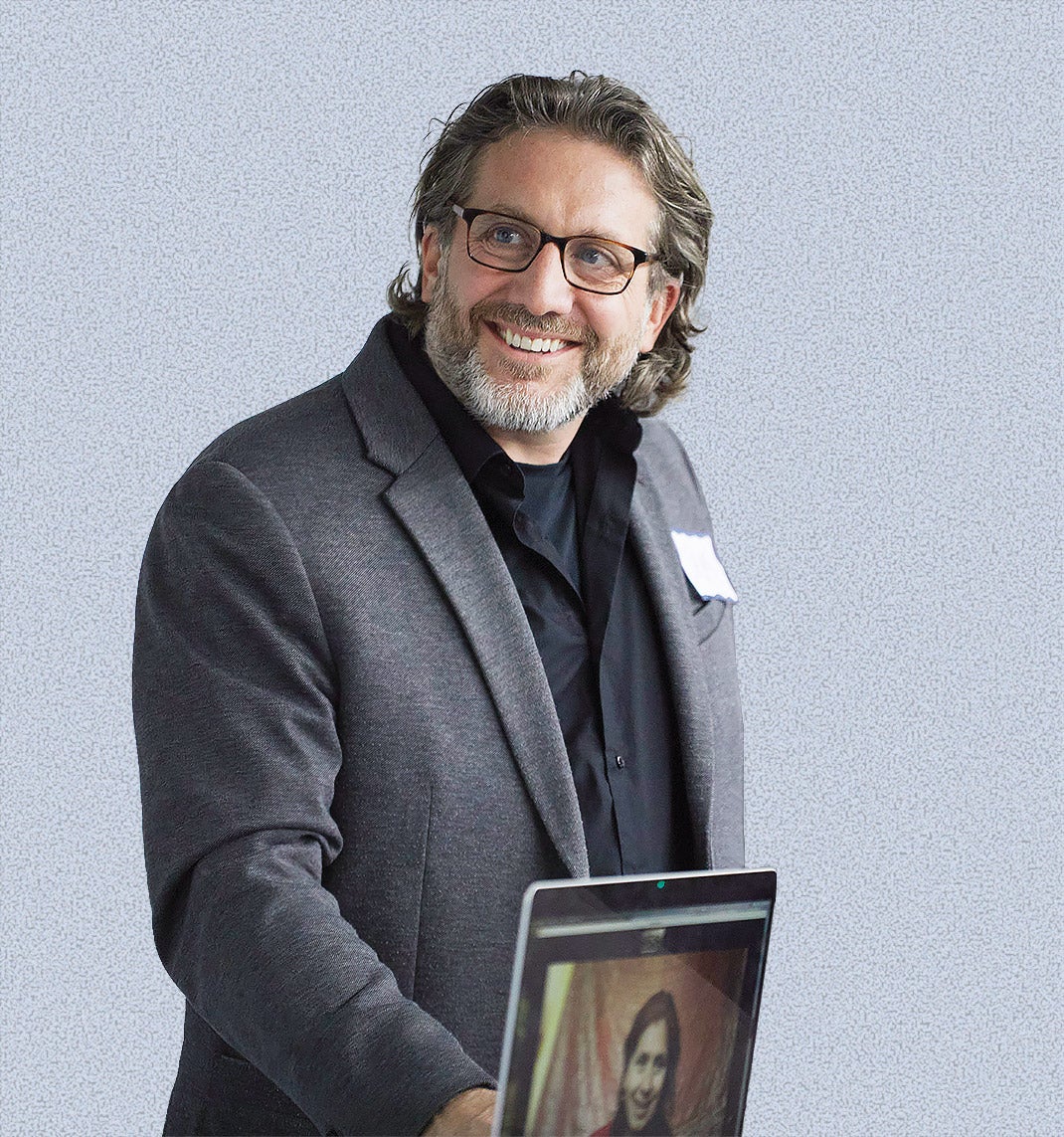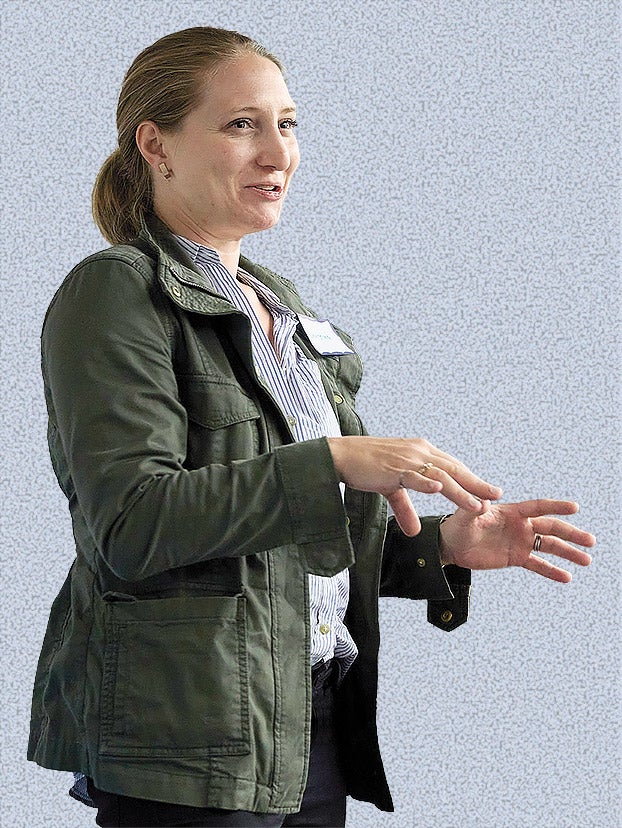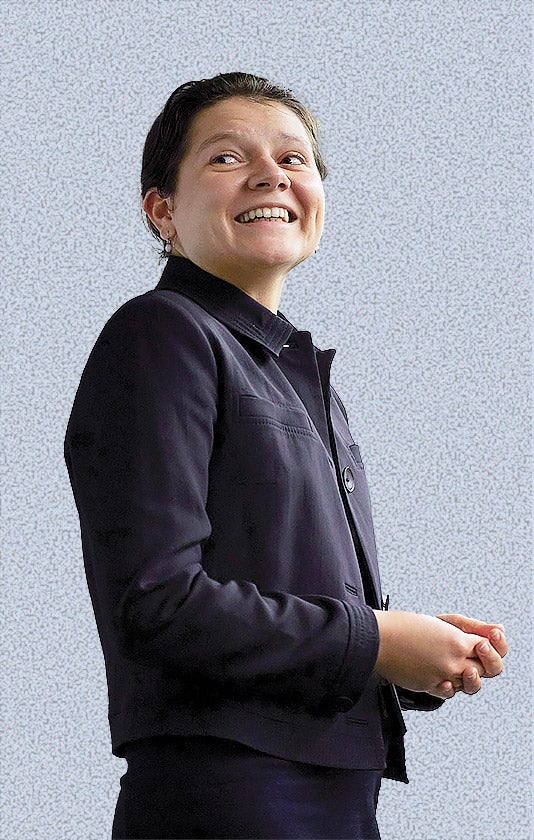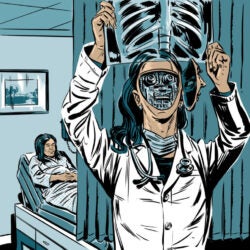
Feature
HealthLab Accelerators helps students launch startups
Nearly 100 students from across Harvard and beyond packed a classroom at Harvard T.H. Chan School of Public Health in October, clustering around the door as organizers hustled to find extra seats. They were eager for the chance to pitch their social impact startups and find teammates to help bring their ideas to fruition. The prospect of inspiration sparking in this utilitarian setting reminded Lumas Helaire, assistant dean for population health management and health equity education, of successful tech companies started in garages. “This room is dimly lit but bright with possibility,” he quipped.
That was the vibe at Pitch to Match night for the University’s new HealthLab Accelerators program, which encourages teams of students and researchers to solve problems in public and planetary health. At stake were spots in the program’s first cohort, which would include funding and support to develop their projects.
Among the ventures pitched that night were an app to gamify civic engagement, an affordable stoma device for patients in low-income countries, and a body spray to protect against Lyme disease. Leaders put out calls for collaborators with expertise in areas such as coding, medicine, or finance. Out of 31 applicant teams, 15 finalist ventures were chosen in November. (See complete list at end of article)
HealthLab is a joint program of Harvard Chan School and Harvard College’s Lemann Program on Creativity and Entrepreneurship (LPCE). Organizers aim to promote multidisciplinary collaboration between graduate students, postdoctoral researchers, and undergraduates from across the University. The teams selected for the program receive mentorship from experienced entrepreneurs, guidance from staff, and access to skill-building workshops and networking opportunities—and the chance to compete for one of three $20,000prizes in the spring.
The competition will incorporate a different challenge each year—this year’s challenge focuses on how to measure social impact. Metrics are a fundamental issue for social impact investors, says Helaire, who helps guide HealthLab withSam Magee, the LPCE’s director on creativity and entrepreneurship. Measuring societal impact is hard, because you can’t just count products used or treatments made and translate it to better outcomes. “People who want to make an impact can probably speak about their work in very clear ways, but not necessarily measurable ways,” Helaire said. “But if we can’t measure the work, how do we know that we’ve had the impact we’ve intended?”
Magee describes HealthLab as a pioneering accelerator. “Harvard students are eager to launch actionable ventures. They want to apply their intellectual horsepower to solve global problems and transform society for the better—and they want to take action while they are students, not after graduation, but right now.”
LPCE had been running social impact competitions for two years and partnering with Harvard Chan School was an ideal fit for making the program available to more students, Helaire said, noting that just about any social impact venture touches public health in some way.
HealthLab’s primary emphasis on entry-level ventures focused on social impact and public health solutions is what distinguishes it from the entrepreneurial opportunities at Harvard Innovation Labs, Helaire said. But he added that the programs aren’t competing, and students could be involved with both.
Helaire, who joined the School in 2021 in a newly created role, works to identify, develop, and promote health equity collaborative initiatives within and beyond Harvard. He is particularly enthusiastic about HealthLab’s focus on building interdisciplinary teams, and the potential synergy that can happen when people from different disciplines and stages in their careers—from student to veteran—come together. Working to create social impact ventures involves seeing if an idea can be made concrete, he says. It’s a form of learning by doing, which Helaire calls “one of the most efficient and impactful ways to learn,” not least because “it’s been my experience that when I take an idea and I share it with someone who has a completely different perspective, they take that idea, they stretch it, and they grow it.”
HealthLab is also working to encourage the next generation of social impact entrepreneurs through outreach to local high school students. Helaire and hisHealthLab colleagues are partnering with organizations like the Boys & Girls Club of Dorchester in Boston to develop workshops tailored toward issues students care about. The goal, Helaire says, is to empower students by showing them they—like the Harvard students packing the room at Pitch-to-Match—can have a voice in solving problems that affect their lives.
A look at this year’s HealthLab teams
ARCHEPI
Adele Houghton,DrPH ’23, is working on a digital tool that brings together real estate developers, community groups, and local governments to create green buildings that improve community health. This venture aims to make the building sector a primary force for addressing both climate change and chronic disease.
COMMUNITY CARES
Keona Wynne, PhD ’24, andJustin W. Morgan, PhD ’24, have teamed up to form a health equity company that specializes in primary and preventative care festivals in U.S. Black communities to combat health disparities and inspire hope. Their board includes Onisha Etkins, PhD ’21.
IVY LEAGUE MENTORING
A team of undergraduates from Harvard, Dartmouth, and Columbia is launching an online platform that connects college students from Ivy League schools with opportunities to mentor high school students in underserved communities.
LOW COST OSTOMY DEVICE
Christina Schweitzer, MPH ’23, a general surgery resident at the University of British Columbia, has teamed up with other Harvard Chan School students and UBC surgeons to develop an environmentally sustainable and culturally appropriate low-cost ostomy appliance for primary use in low-and middle-income communities.
SAFE PSYLOCIBIN
Selene Manga, a physician and Takemi Fellow at Harvard Chan School, has teamed with Kayembe Benita,SM ’23, and two Harvard College students to develop self-administered psilocybin-based patches designed to treat a range of mental health disorders.
SIDESTREET
Calvin Harjono and Saad Soroya, both MPH ’23, from Harvard Chan School have teamed up to develop a digital platform that enables and deploys community health workers by connecting them with each other and with job options and resources. The goal is to help these workers advance both their careers and the health of their communities.
TINY CATALYST
Pauline Nuth, DrPH ’25, has teamed with an engineering graduate from UC Berkeley to develop a virtual network and platform that gathers volunteers in the U.S. to work on public health and social impact issues.
WELLSPACE
Maria Ko from Harvard Graduate School of Education and Rachel Lee, MPH ’23, are developing an online wellness school that designs and delivers e-learning experiences on holistic health and well-being to people with chronic health conditions
AUGMEND
Artemiy Shlyaptsev, a Harvard Kennedy School (HKS) student, and team members from MIT and theUniversity of Quebec, are creating a digital therapy platform that delivers virtual reality therapy combined with bio-feedback technology and artificial intelligence. The aim is to unburden clinicians and prevent relapses in mental health conditions.
DETOXYFI
A student from HKS and a recent graduate of Harvard Business School (HBS) are teaming with Rohit Karnikan, an MIT professor known for his expertise in clean water innovations, to develop an efficient, sustainable, and affordable water filtration device for household use.
LOTUS
Two Harvard College students are creating a social media app that connects women experiencing infertility in a safe and moderated space.
PH FUTURES
A team of students from Harvard Law School, Harvard Medical School, and Harvard DivinitySchool are creating a woman-and LGBT-owned venture capital firm. It aims to bring accessible plant-based products and services to market by identifying and supporting startups innovating toward planetary health, social impact, and environmental impact.
SELENE HEALTH
Siwei Zhu, SM ’23, and teammates from the Yale School of Public Health and University ofWashington, are working on personalized medication and digital health tools for menopausal women.
SLEEPRO
SleePro is a voice-based circadian diagnostic and management platform for better sleep, performance, and holistic health. The team includes Xinyu Ma, SM ’20, and expert advisers on sleep disorders and affective computing from Harvard Medical School and MIT.
VISHVAAS HEALTH
A team of three HBS students is developing a mobile-based scheduling and notification system for medical appointments in rural India. This venture aims to drive trust, or vishvaas, in the medical system and build healthy communities.
Top image: Ghrzuzudu Zi / iStock
